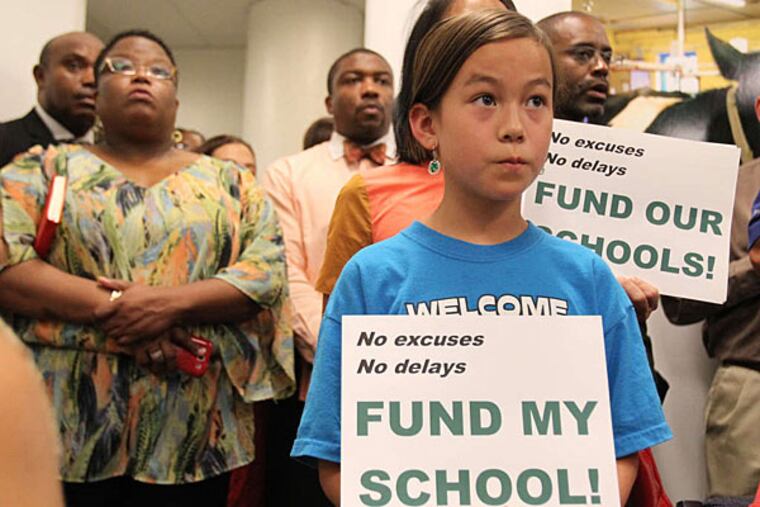With schools on the brink, Nutter and Clarke diverge
The mayor and Council president aren't on the same page on how to make sure schools open next month.

IF YOU'RE CONFUSED about what's going on with Philadelphia's school-funding crisis, look no further than the news conferences and posturing yesterday that provided a microcosm for why Philly's schools are on the brink only 31 days before school begins.
It began with Superintendent William R. Hite Jr. saying that if the city's politicians don't find $50 million in new funding soon, schools will be in disastrous condition when doors open on Sept. 9 - if they can open at all.
Up next was Mayor Nutter, who made a fervid speech calling on City Council to back a tax plan crafted in Harrisburg that would allow the city to borrow the money Hite says is needed.
Minutes later, Council President Darrell Clarke took to a podium, saying he opposes that plan and proposing a new one involving the sale of school property.
Meanwhile, the teachers' union - from which the district is seeking $133 million in savings - issued a statement indicating it's not budging, and Harrisburg lawmakers - who this June approved only $2 million in new annual funding for Philly schools after being asked for $120 million - continued their summer recess.
In the end, the school district was right where it was when the day began: broke.
Speaking at district headquarters, Hite said schools may not be able to open next month without at least $50 million in new funding, which, combined with other measures, still won't plug the district's $304 million deficit.
"I am angry that we are here today, facing these circumstances," he said. "Without the funds to restore crucial staff members, we cannot open functional schools, run them responsibly or provide a quality education."
The 218-school district in June laid off almost 3,900 employees, primarily hall aids, guidance counselors, secretaries and assistant principals. The School Reform Commission has requested $120 million in new state funding, $60 million more from the city and $133 million in labor savings just to get the district's balance sheet back to zero.
The $50 million would allow the district to rehire close to 1,000 laid-off employees, said Deputy Superintendent Paul Kihn.
There is "not a scenario that brings back everyone who was laid off," Hite said.
At City Hall, Nutter called on City Council members to sign a letter saying they support a permanent extension of what was supposed to be a 1 percent temporary sales-tax increase. That would allow the city to immediately borrow $50 million against the increase's future revenue, which would start at about $120 million in 2015.
"Without immediate action and commitment from our City Council, our schools will be unsafe," Nutter said. "No rational adult who cares about children would ever subject them to the reality of a school without the necessary supports that'll provide for a safe environment."
Gov. Corbett paved the way for the sales-tax extension to be authorized during the state's budget negotiations last month. The city would need to adopt it for it to become law. Clarke opposes the extension, as drafted in Harrisburg, because he wants half the revenue for the city's massively underfunded pension system.
In Corbett's version, almost all the initial revenue goes to the school district. A small slice dedicated to pensions is projected to grow over time and would eventually provide $400 million over 10 years, Finance Director Rob Dubow said.
Nutter said he wasn't happy with the Harrisburg plan but that it's the only viable option to help the schools before classes begin.
"This was not my idea and not the Council president's idea, but ultimately we were presented in the lateness of the budget process in Harrisburg with really not so much of what is called a deal, but a reality," Nutter said.
Clarke then said in Council chambers that the sales-tax extension was a "bad deal."
"I don't think that we should sign onto what I believe to be a bad deal," Clarke said. "If we don't solve [the pension problem], we could quickly be following some of the other cities that are finding themselves in some significant financial situations."
He laid out a new plan for the city to buy unused district properties, including closed schools, and borrow $50 million against the future sale of those assets, providing leaders time to re-evaluate the sales tax.
Nutter spokesman Mark McDonald said the plan is "bad public policy."
"It would not be prudent for the city to suddenly buy 23 school district buildings when there is no known reuse for these buildings, when they have not been formally appraised, when there's no funds available for their care," he said.
McDonald said the plan would be "double-dipping" with district money since the School Reform Commission's five-year plan already counts on revenue from selling those properties.
With Nutter and Clarke divided on how to move forward, it's unclear how the schools will get the money Hite says they need to open.
Helen Gym, of Parents United for Public Education, said it was "unconscionable" that the debate was still going on. "It's crazy to play brinkmanship games like this with our children's lives," she said.
Susan Gobreski, executive director of Education Voters of Pennsylvania, sent a message to elected city and state officials.
"I think that the superintendent is right to keep people focused on the fact that this is an extraordinary crisis," Gobreski said. "And I think that we are in dire, dire straights. Our political leadership in this city and at the state level have not delivered the funding."
"If it doesn't have an impact, voters should rebel . I think people are frustrated and angry that this basic response has been unmet."
- Staff writer Jessica Glazer contributed to this report.
Blog: ph.ly/PhillyClout